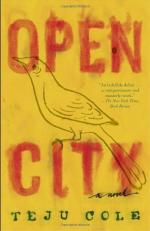
|
| Name: _________________________ | Period: ___________________ |
This test consists of 5 multiple choice questions, 5 short answer questions, and 10 short essay questions.
Multiple Choice Questions
1. Who wrote the cantatas Julius had heard at Lincoln Center, before coming to visit Dr. Saito?
(a) Stravinsky.
(b) Rachmaninov.
(c) Tchaikovsky.
(d) Bach.
2. When Julius sees children on a playground on his way home from the appointment with his accountant in Chapter 13, what does he say the creak-creak of the swings signifies to them?
(a) That they need to be careful.
(b) That their parents are there to push them.
(c) That they are having fun.
(d) That they are surrounded by familiar things.
3. What does Julius say Americans have exhausted themselves with, during the picnic in Central Park?
(a) Productivity.
(b) Hyperbole.
(c) Consumption.
(d) Enjoyment.
4. How does Julius regard the Africans he sees in Chapter 11, once he finds out where they really come from?
(a) Joyously.
(b) Spitefully.
(c) Suspiciously.
(d) Angrily.
5. What does Julius say the Statue of Liberty served as until 1902?
(a) A lighthouse.
(b) A detention center.
(c) An immigration processing center.
(d) A tourist destination.
Short Answer Questions
1. What part of academia does Julius say he has never had a stomach for?
2. What does Julius say his memory of his father’s burial has merged with?
3. Whose obituary do the street performers make Julius think of?
4. What animal does Dr. Saito say he is ready to come for him in Chapter 15?
5. What is the title Teju Cole gives to Part 2 of Open City, beginning with Chapter 12?
Short Essay Questions
1. How does Julius explain his views about psychiatry to his friend?
2. What is Julius’ reaction to meeting Moji Kasali?
3. Chapter 11 marks the end of “Part 1: Death is a perfection of the eye.” In what way is this title appropriate to the first 11 chapters?
4. What is Julius’ relationship like with the character he never names, but simply calls “my friend” (179)?
5. How does Julius characterize his trip to the tailor to get clothing for his father’s funeral?
6. How does Julius kill half an hour when he is early to meet Dr. Maillotte?
7. How is Julius affected by his thoughts about slavery in New York?
8. What is the postcard Julius keeps on the corkboard behind his desk?
9. What are Julius’ dreams like, after he hears about Dr. Saito’s bedbugs?
10. How does Julius say that he reacted when he saved the boy’s life who had been about to drown?
|
This section contains 1,215 words (approx. 5 pages at 300 words per page) |

|




